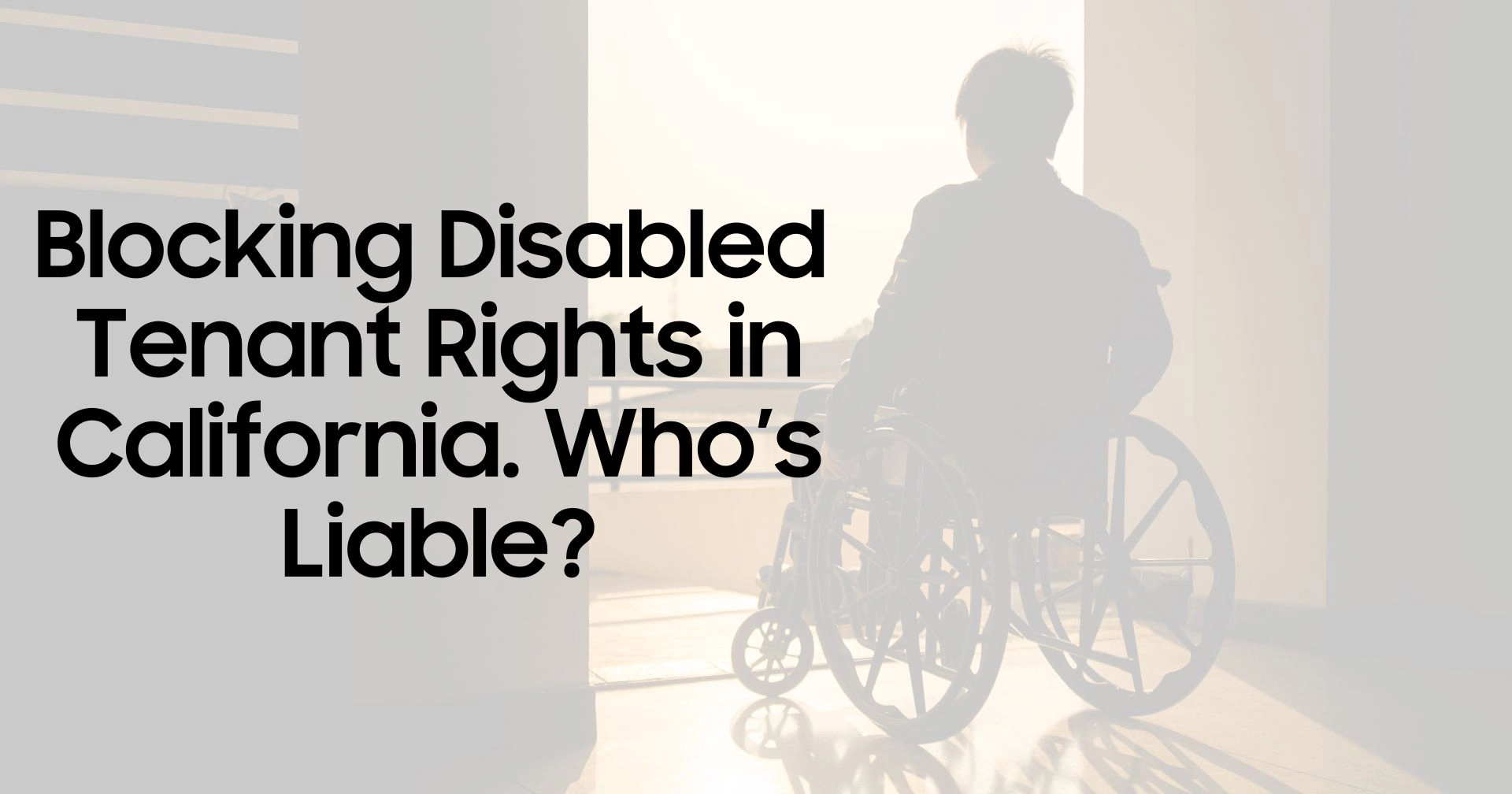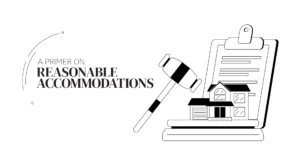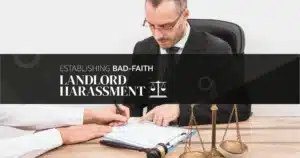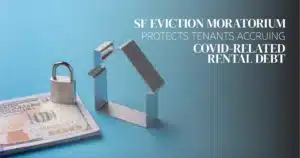Finding an apartment in Los Angeles is hard. Rents are sky-high. Options are few. Now, throw a disability into the mix.
You use a wheelchair. You need a ground-floor unit or an elevator. Doorways must be wide enough for your chair. Grab bars in the bathroom aren’t fancy—they’re essential.
You start calling places. The first landlord sighs, “No accessible units.” The second says, “No modifications allowed.” The third just hangs up. Some “will check” but never call back. You visit a hopeful spot. No ramp. No elevator. No chance.
Days turn into weeks, and frustration grows. How can so many places be off-limits for disabled tenants? Isn’t housing discrimination against the law? Who enforces these rules? You search online. Legal terms fill the screen. California has protections, but do landlords care?
Remember: Thousands of disabled renters in California face these hurdles. Landlords deny requests, buildings stay off-limits, and rights go unprotected. Who holds landlords accountable? What legal paths exist? How do you fight back?
1. Landlords Denying Reasonable Accommodations
Landlords often reject requests from disabled tenants. They claim changes cost too much. Some say modifications would “alter the property.” Others simply delay, hoping tenants give up. These tactics push disabled renters into unsafe living situations or even force them out.
A 2024 case, Tamshoona v. Beach Front Property Management, Inc., showed this discrimination. Noor Tamshoona, who uses a motorized wheelchair, stored it in a locked room for years. When Beach Front took over, they revoked her access without notice, locked her wheelchair away, and demanded a monthly fee—first $100, then $200.
For almost two years, Tamshoona was stuck at home, missing medical appointments and family events. She sued under the Fair Housing Amendments Act and California laws protecting disabled rights. The case seeks policy changes, fair housing training, and damages. Experts label Beach Front’s actions as “egregious” and a clear breach of disability laws.
Solution: Enforcing Reasonable Accommodation Laws
In California, landlords must provide reasonable accommodations. Ramps, grab bars, and accessible parking are essential. No landlord can use “high costs” as an excuse. If a landlord refuses, tenants have legal tools.
Document everything. Write down requests. Save emails, letters, and responses. If denied, file a complaint with the California Civil Rights Department or get legal help. Courts often side with tenants. Uncooperative landlords face lawsuits, hefty fines, and demand modifications.
2. Misunderstanding of Disability Rights
Many landlords misinterpret disability rights laws. It leads to unintentional discrimination. Ignorance keeps housing inequality alive, but it isn’t a legally valid defense.
In October 2024, an investigation found widespread discrimination against California tenants with Housing Choice Vouchers. The Housing Rights Initiative complained against 203 real estate agents and landlords in cities from Los Angeles to San Jose. Many didn’t know—or ignored—laws against discrimination based on income sources. This case highlights the urgent need for landlord education on fair housing laws.
Solution: Educating Landlords on Disability Rights
Education is key. Landlords should learn about the California Fair Employment and Housing Act’s disability rights provisions. Resources are available through the California Civil Rights Department. Informed landlords prevent unintentional discrimination and promote fair housing.
3. Physical Barriers in Housing
Many properties lack necessary accessible features, such as stairs without ramps, narrow doorways, and inaccessible bathrooms. These barriers block disabled individuals from housing.
In 2023, the California Civil Rights Department (CRD) sued a Los Angeles property management company. They failed to provide accessible features in their apartment complexes. The investigation found many properties lacked ramps, making it impossible for wheelchair users to access them. The lawsuit cited violations of the California Fair Employment and Housing Act. This case underscores the need for adherence to accessibility standards.
Solution: Implementing Accessible Housing Requirements
California law requires accessible housing. New buildings must follow these standards, and older ones should be retrofitted when possible. Tenants can request modifications, and landlords must comply unless it causes undue hardship.
4. Retaliation Against Disabled Tenants
Retaliation against disabled tenants who assert rights is a big problem. Landlords may raise rent or try to evict after accommodation requests. It intimidates tenants and deters them from claiming their rights.
In a notable case, Gary Gilbert, a legally blind 67-year-old tenant in Oakland, faced wrongful eviction. He consistently paid rent but didn’t see the eviction notice. Gilbert depended on family for finances and communication. When he found out, he had only seven days to leave. Attorney Maria Guerra intervened and won, but the complex refused to reinstate him. This case highlights the challenges faced by disabled tenants.
Solution: Legal Protections Against Retaliation
Retaliation against tenants for asserting rights is illegal in California. The Fair Employment and Housing Act prohibits discrimination and retaliation. Tenants can file complaints without fear. Keeping records of landlord actions strengthens your position. If retaliation happens, file a complaint with the California Civil Rights Department.
5. Problem: Lack of Awareness Among Tenants
Many tenants don’t know their rights. They suffer discrimination, thinking they can’t fight back. This ignorance lets violations continue unchecked.
An undercover investigation by the Housing Rights Initiative found extensive discrimination against Section 8 voucher holders. Over 200 landlords and firms violated a 2019 state law. Denial rates vary by city, as there were 44% in San Francisco, 53% in Oakland, 58% in San Jose, and 70% in Los Angeles. This case highlights the need for tenant education on fair housing laws.
Solution: Empowering Tenants Through Information
Knowledge empowers tenants. Organizations like the Law Firm for Tenant Rights, Inc. provide resources and guidance. Understanding your rights is crucial. Informed tenants can effectively challenge discrimination.
Stand Up for Your Rights—Because Housing Discrimination Won’t Stop on Its Own
Disabled tenants in California face many hurdles. Landlords deny reasonable accommodations, and others retaliate with higher rents or evictions. Physical barriers make living impossible. Many tenants don’t know their rights, allowing discrimination to grow unchecked.
We’ve seen this play out in real cases. So, are you facing such challenges? Has your landlord ignored your request? Are you scared to speak up? You don’t have to fight this alone. The Law Firm for Tenant Rights is ready to help.
Document everything. Demand your rights. Take action. Contact us today for a free consultation. Don’t suffer in silence against housing discrimination.






